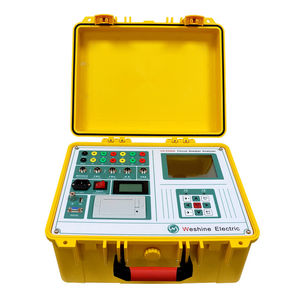
- Metrology - Laboratory
- Metrology and Test Equipment
- Resistance testing device
- Weshine Electric Manufacturer CO Ltd
Resistance test equipment VS-5201manualcircuit breakerportable
Add to favorites
Compare this product
Characteristics
- Test type
- resistance
- Operating mode
- manual
- Test material
- circuit breaker
- Configuration
- portable
Description
Contact resistance test is testing the resistance to current flow, due to surface conditions and other causes, when contacts are touching one another (in the closed condition of the device). This can occur between contacts of: Breakers/Contactors/Relays/Switches/Connectors/Other switching devices.
Contact resistance test also known as Loop Resistance Test or Ductor testing, measures the resistance of electrical connections – terminations, joints, connectors, busbar sections or cable connections and so on. These can be connections between any two conductors, for example, cable connections or busbar sections. The instrument which is used to perform the contact resistance test is called an Ohmmeter, and since its function is to perform the Contact resistance test, the ohmmeter is also known as a Micro-ohmmeter.
When a high current passes through a pair of mechanically independent metallic contacts, the resistance must be as low as possible. An increase in resistance can lead to additional degradation, as I2R losses will cause local heating of the contact surfaces. Weshine® invented range of Contact Resistance Test Set for circuit breaker test measure both steady state and dynamic low resistance values. With test currents up to 600 A available, logging and trending are also available on some models. Weshine® ensure that Contact Resistance Test Set for circuit breaker test are portable, making them suitable for field measurements. Weshine® Contact Resistance Test Sets’ portability makes them ideal for a vast range of resistance testing across the entire LV, MV HV and EHV spectrum.
Catalogs
No catalogs are available for this product.
See all of Weshine Electric Manufacturer CO Ltd‘s catalogsOther Weshine Electric Manufacturer CO Ltd products
Circuit Breaker Test
Related Searches
- Measuring device
- Portable testing system
- Digital measuring device
- Digital testing system
- Automatic test equipment
- Automatic testing system
- Manual test kit
- Cabling tester
- Insulation testing system
- Industrial test equipment
- Portable test kit
- Electrical installation tester
- Automatic measuring device
- Viscosity measurement device
- Resistance testing system
- Tester with LCD screen
- Benchtop testing system
- Compact testing system
- Insulation resistance testing system
- Digital test kit
*Prices are pre-tax. They exclude delivery charges and customs duties and do not include additional charges for installation or activation options. Prices are indicative only and may vary by country, with changes to the cost of raw materials and exchange rates.


